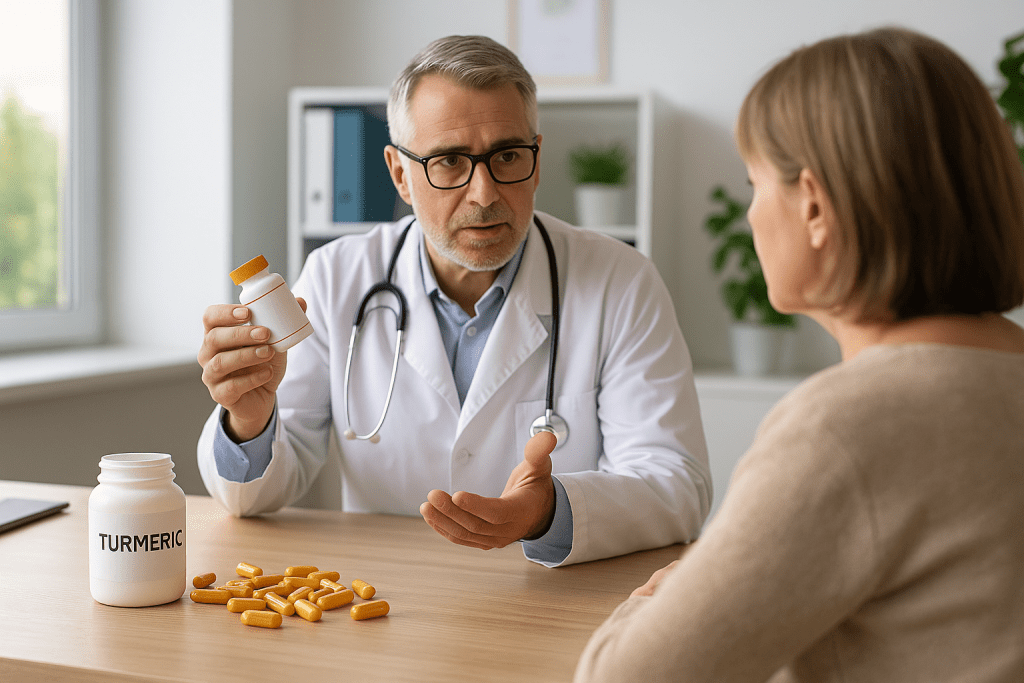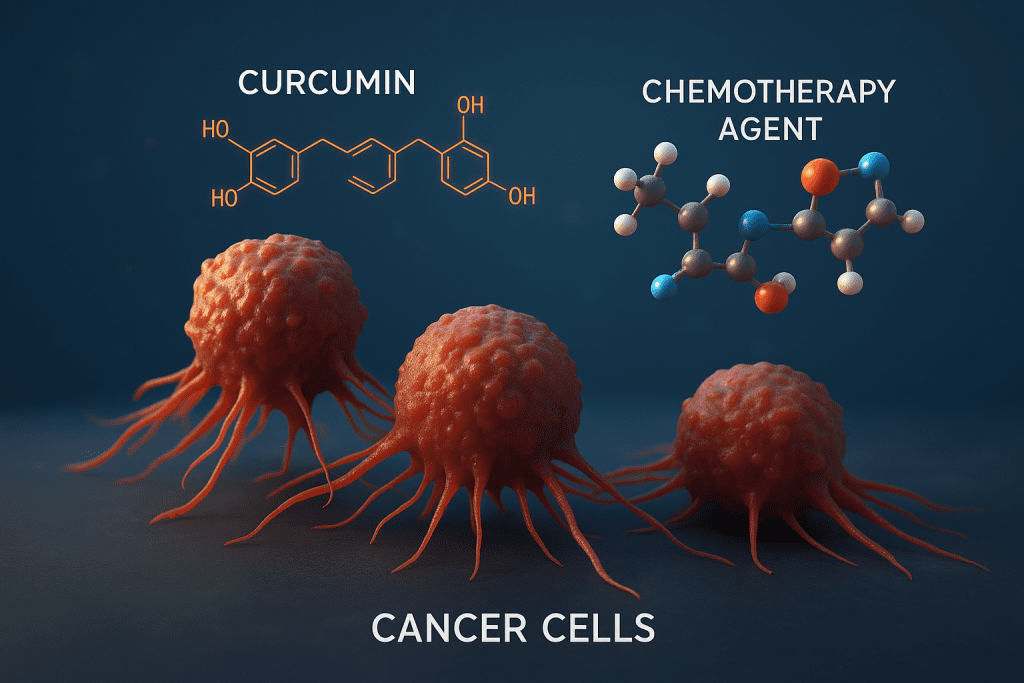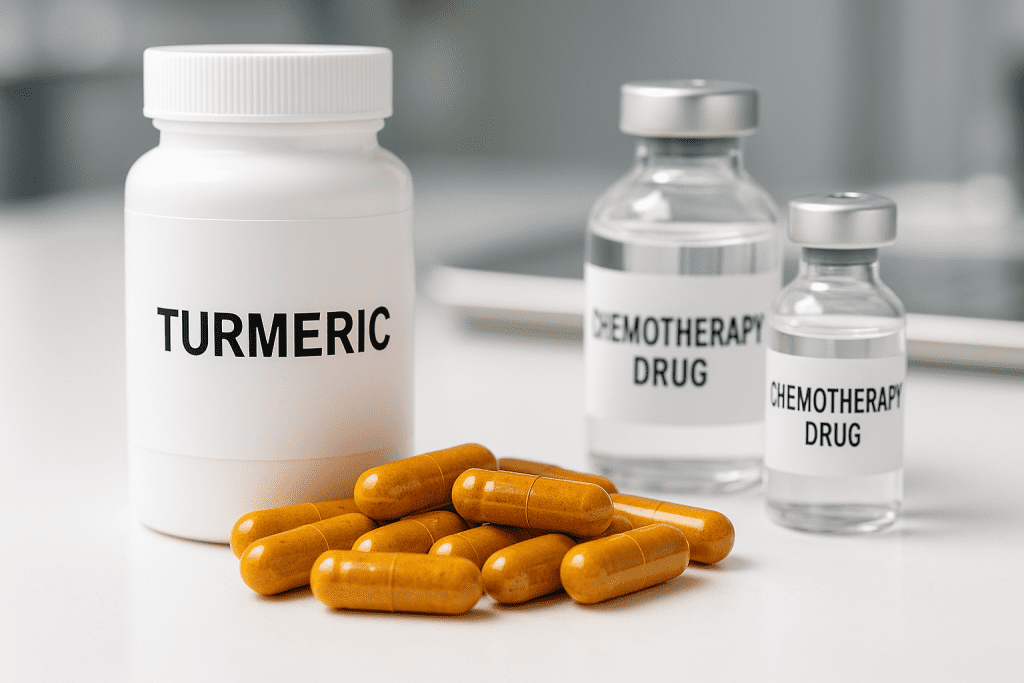
Can Turmeric Help or Harm Chemotherapy? [Quick Summary]
Here’s a fast overview of what science currently says about turmeric (specifically curcumin) and chemotherapy:
| Topic | Evidence Summary |
|---|---|
| Curcumin Enhancing Chemo | Can increase chemosensitivity and overcome drug resistance in some cancers like prostate, colorectal, and breast |
| Curcumin Reducing Chemo Effectiveness | May block apoptosis in drugs like doxorubicin, camptothecin, and etoposide |
| Mechanisms | Antioxidant effects and JNK inhibition can either help or hinder depending on treatment context |
| Safe Use | Food use generally safe; supplements require oncologist oversight |
| Expert Guidance | Oncology centers recommend caution due to conflicting evidence |
Use our Cancer treatment supplement interaction checker to see if turmeric affects your specific chemo drug.
The Double-Edged Sword of Curcumin in Cancer Therapy
Turmeric’s active compound, curcumin, has long fascinated scientists for its anti-inflammatory and antioxidant properties. But its role in cancer care — particularly during chemotherapy — is a delicate balancing act. On one hand, it may improve treatment outcomes; on the other, it might compromise them.
Let’s break down both sides of this complex relationship and explore where current science stands.
How Curcumin May Boost Chemotherapy
Some chemotherapeutic regimens appear to benefit from curcumin’s presence, thanks to its ability to:
- Sensitize tumor cells to treatment
- Overcome drug resistance
- Enhance cancer cell apoptosis
In prostate cancer studies, combining curcumin with docetaxel significantly enhanced treatment efficacy. The combination led to greater tumor cell death by modulating pathways like NF-κB and phospho-Akt, as highlighted in Frontiers in Oncology.
Similarly, in colorectal cancer, curcumin pre-treatment enhanced chemosensitivity to 5-FU and reversed resistance in mismatch repair-deficient cells, according to findings published in Molecules. This synergy has also been observed with oxaliplatin in gastric cancer.
Curcumin has also shown promise in ovarian cancer and non-small cell lung carcinoma, where it enhanced sensitivity to cisplatin, particularly when paired with compounds like resveratrol.
A phase-I trial in patients with metastatic breast cancer combined curcumin (500 mg/day) with docetaxel and found promising biological activity. Similarly, in colorectal liver metastases, curcumin enhanced the cytotoxic effects of FOLFOX chemotherapy.
Turmeric supplements may offer benefits in specific cancers, but their impact varies by drug. Learn more about rash from vitamin C and chemotherapy drugs and supplement interactions.
Reversing Resistance: One of Curcumin’s Most Promising Roles
A standout feature of curcumin is its ability to inhibit multidrug resistance (MDR) mechanisms. Studies in oncology pharmacology show that curcumin downregulates proteins like Bcl-2, enhancing cell death even in previously unresponsive tumors.
These actions support curcumin’s potential role as a “chemo-sensitizer,” helping overcome resistance that often limits treatment success.
When Curcumin May Reduce Chemo Effectiveness
Despite its therapeutic potential, curcumin is not universally beneficial. In some contexts, especially with certain chemotherapy drugs, it can actually impede treatment.

Antagonistic Effects With Key Chemo Agents
Studies published by the American Association for Cancer Research found that curcumin interfered with apoptosis induced by drugs like:
- Doxorubicin
- Camptothecin
- Mechlorethamine
- Etoposide
Even low doses of curcumin (1 μM) blocked up to 70% of drug-induced apoptosis in breast cancer cells. In the case of etoposide, four out of five cancer lines showed decreased response when combined with curcumin. The issue? Curcumin caused tumor cells to pause in the S and G2/M phases of the cell cycle, preventing DNA-damaged cells from progressing to apoptosis.
Why These Inhibitory Effects Occur
Curcumin’s antioxidant activity, while protective in some contexts, may hinder chemotherapy by:
- Inhibiting reactive oxygen species (ROS) — key to chemo-induced cell death
- Blocking JNK activation — a pathway essential for apoptosis
- Preventing cytochrome c release from mitochondria
In in vivo models, dietary curcumin blunted the tumor-shrinking effects of cyclophosphamide, likely due to these same mechanisms.
These findings highlight a paradox: the very pathways curcumin protects in healthy tissue may sabotage chemotherapy’s effectiveness in cancer cells.
What Oncologists Recommend About Turmeric Use
General Guidelines from Cancer Centers
Leading institutions like the Memorial Sloan Kettering Cancer Center recommend caution. While turmeric in food is typically safe, they advise patients to avoid turmeric supplements during active chemotherapy unless supervised by a healthcare provider.
The mantra: “Natural” doesn’t always mean safe.
Evidence-Based Protocols from Integrative Oncology
The Society for Integrative Oncology has developed guidelines that incorporate complementary therapies into cancer care. These provide clinicians with tools to evaluate turmeric’s appropriateness based on:
- Cancer type
- Chemotherapy regimen
- Patient health status
The ASCO-SIO guidelines further emphasize individualization and evidence-based integration.
Typical Dosages and Safety Considerations
When turmeric is used under medical supervision, typical curcumin dosages range from 500 to 3,000 mg/day, often with piperine to enhance bioavailability. Taken with fat-containing meals, absorption improves.
However, these doses can interfere with chemotherapy. That’s why experts stress personalized plans, not blanket supplement use.
Use our Cancer treatment supplement interaction checker for drug-specific advice.
Final Thoughts: Curcumin in Cancer Care Requires Caution

Turmeric and chemotherapy interact in complex, context-dependent ways. Curcumin may offer real advantages in certain cancers and drug combinations — but it can also undermine treatment in others. Key takeaways:
- Synergistic potential exists with drugs like 5-FU, docetaxel, and oxaliplatin
- Antagonistic effects are real with agents like doxorubicin, etoposide, and camptothecin
- Mechanisms matter: curcumin’s impact on ROS and apoptosis pathways are double-edged
- Dosage and timing are critical
If you’re undergoing treatment, speak with your oncologist before adding turmeric supplements. When in doubt, rely on your care team and trusted tools like our Cancer treatment supplement interaction checker.
For related reading, check out our guide on rash from vitamin C and chemotherapy drugs.



Pingback: MyRxProfile Alternative Apps [Comparison Guide] | Useful Vitamins